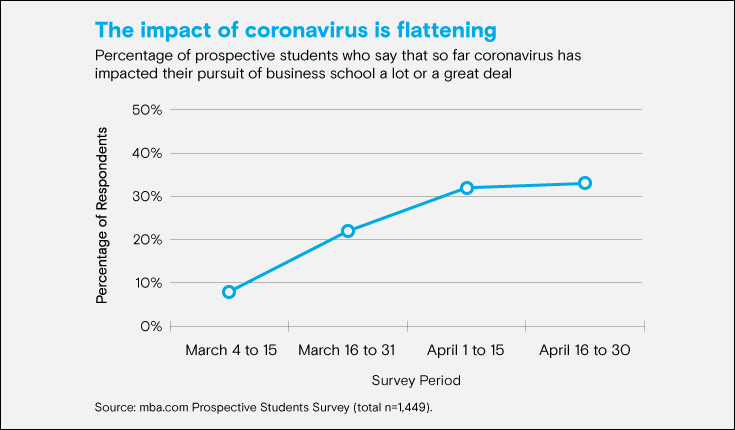Its Impact Flattening, Coronavirus Continues to Leave Business School Applicants with Tough Choices [Survey]

New survey findings suggest the impact of coronavirus on prospective students is flattening, but some applicants who gain admission for the fall may want to defer.
The decision to pursue a graduate business school degree like an MBA or business master’s isn’t one that you come to overnight. For most, it’s a choice that comes with a considerable amount of forethought and planning. Now, amid coronavirus, many prospective students at different stages of the admissions process are considering what the pandemic means for their plans as they chart their course to business school.
To understand how prospective students are feeling in this new environment, we’ve been conducting an ongoing survey to measure the impact of COVID-19 on candidates’ pursuit of a graduate business school education. Through the end of April, nearly 1,500 prospective students have provided their perspectives. Here are some 0f the latest findings:
The impact of coronavirus is flattening
Overall, 1 in 3 prospective students who responded to the survey in the second half of April say that so far COVID-19 has impacted their pursuit of business school a lot or a great deal (33%)—about the same as the first half of April (32%). This period of stabilization comes after consistent growth from early March to mid-April.

This flattening effect is likely influenced by the trajectory of the COVID-19 crisis itself, but is also likely the result of MBA and business master’s programs showing unprecedented flexibility to help applicants keep their plans on track during this challenging time, as many programs have extended application deadlines, or are allowing applicants to submit exam scores past the deadline. For the latest updates from schools, visit the mba.com COVID-19 Program Updates page or look up your programs of interest in Program Finder.
Regionally, the prospective students who are the most likely to say coronavirus has impacted their pursuit of business school a lot or a great deal live in Middle East Africa (46% in April), East and Southeast Asia (43%), and Central Asia (39%). In the United States and Europe, prospective students are more likely to say coronavirus has had little or no impact on their pursuit of business school (45% each).
Applicants remain resolute in their goals, but some may delay
A consistent finding since the launch of the survey in early March is that applicants remain resolute in their business school goals, as very few say they may abandon their pursuit of a graduate business degree as a result of COVID-19. Just 6 percent of April survey respondents in the current admissions cycle say they are considering no longer pursuing graduate business education.
While most are holding fast to their business school goals, about half say they’re weighing the difficult choice of delaying their plans. Overall, 48 percent of prospective students surveyed in the second half of April say they’re considering delaying, down slightly from the first half of the month (51%).
Looking at responses from across April, those active in the current admissions cycle are less likely to express plans to delay (43%) compared with those who are less far along in the process, including those who are still researching programs (54%) and those who are currently researching going to business school generally (59%).
For some, enrollment plans hinge on whether classes will start on campus or online
A key factor that may impact the decisions of applicants who gain admission for the fall is whether or not their coursework will begin in-person or will have to start online due to continued social distancing.
Overall, 84 percent of applicants for fall 2020 admission say that if admitted, they would most likely accept and enroll. Just 14 percent say they would want to defer, and 2 percent would decline. When asked the same question with the caveat that their program would begin online due to a continuation of social distancing, the percentage who say they would most likely defer increases to 36 percent. Five percent say they would decline enrollment altogether.
Regionally, applicants from Central and South Asia are the most likely to say they would defer (58%) or decline (13%) if classes begin online. Open-end responses reveal these applicants are concerned that online coursework would rob them of some of the benefits of business school that are inherent to being physically on campus. An Indian MBA applicant who says she would most likely defer if classes begin online said: “Business school is all about on-campus presence and networking, not just sitting on a computer attending lecture.”
Among applicants from East and Southeast Asia, 42 percent say they would most likely defer if classes begin online, and 6 percent say they would decline. A Chinese MBA applicant who says she would most likely defer said: “The biggest value of an MBA program is to work together with classmates from all over the world and inspire new ideas and learnings through face-to-face discussion.”
Something the two quoted applicants have in common is that they both aspire to study internationally. Across regions and countries, a greater share of international applicants (applicants whose preferred study destination is not their country of citizenship) say they would defer (42%) or decline (8%) if classes begin online compared with domestic applicants (30% and 3%, respectively).
Impacts and concerns for international and domestic applicants
While of course the COVID-19 pandemic has affected everyone who is currently pursuing business school in one way or another, the survey findings highlight how the impact has been more acutely felt among international applicants than domestic applicants, who even under normal circumstances face a more complicated journey to business school.
Among prospective students surveyed in the month of April, a greater share of those who planned to study internationally expressed that coronavirus has impacted their pursuit of business school a lot or a great deal (36% vs. 29%) and say they are very or extremely concerned about its impact on their future pursuit of a business school education (48% vs. 35%). Specifically, international prospective students surveyed in April express concern about travel bans (63%), the region where they want to study being highly affected (59%), the job market status (51%), school closures (44%), completing visa applications/requirements (31%), and the social reaction to international students (31%).
Domestic prospective students express a similarly high level of concern for the job market status (50%) and school closures (47%).
The GMAT Online exam is a solution to prospective students’ top concern
Another area of concern that’s shared among international and domestic prospective students is the availability of admissions testing. Overall in the month of April, prospective students expressed that their top area of concern is the ability to take an admissions test because of test center closures (53%).
To keep your business school plans on track, the makers of the GMAT exam have developed an interim online exam to help applicants meet upcoming application deadlines and stand out to business schools in the admissions process. Offered at a lower price than the traditional test center-based exam, the new format allows you test in the familiar space of your home on your PC or Mac computer with testing appointments available around the clock—24 hours a day, 7 days a week.
Here are the six things you need to know about the GMAT Online exam.
Are you ready to take the GMAT exam at home? Register for the GMAT Online exam today!
